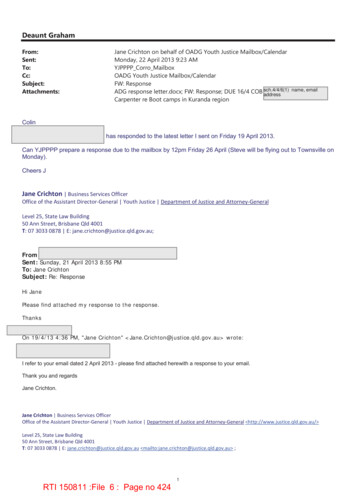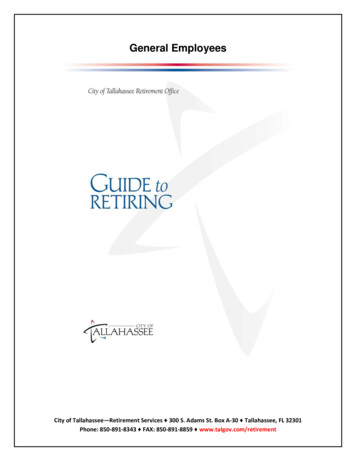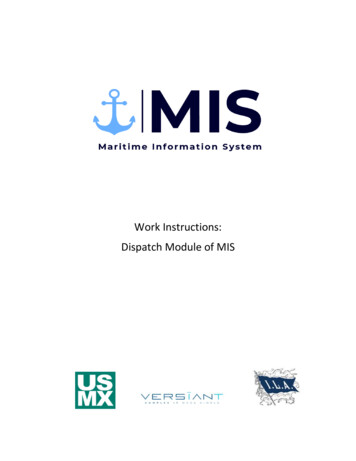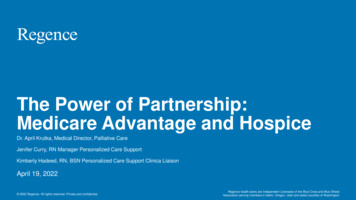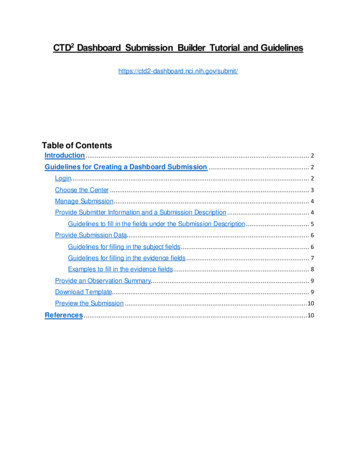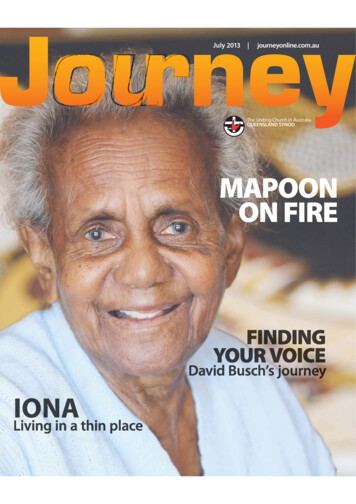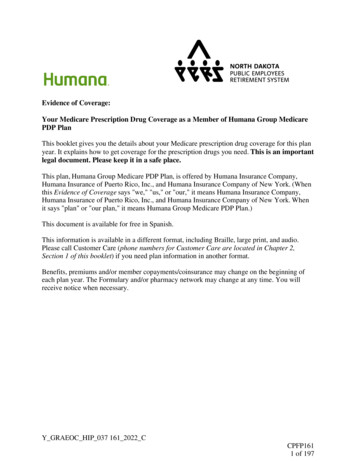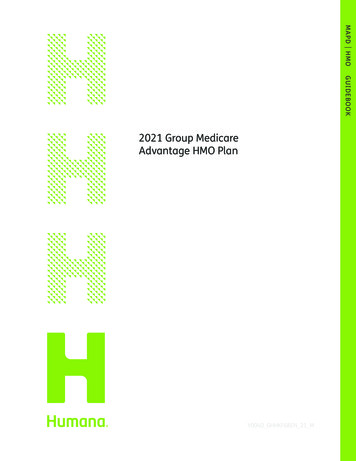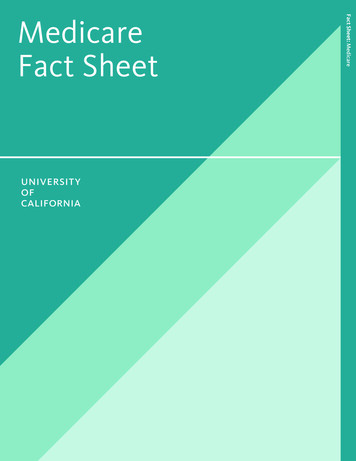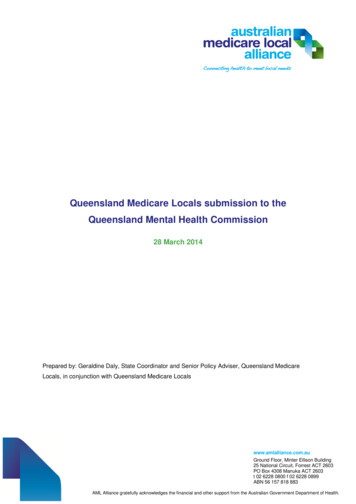
Transcription
Queensland Medicare Locals submission to theQueensland Mental Health Commission28 March 2014Prepared by: Geraldine Daly, State Coordinator and Senior Policy Adviser, Queensland MedicareLocals, in conjunction with Queensland Medicare Localswww.amlalliance.com.auGround Floor, Minter Ellison Building25 National Circuit, Forrest ACT 2603PO Box 4308 Manuka ACT 2603t 02 6228 0800 f 02 6228 0899ABN 56 157 818 883AML Alliance gratefully acknowledges the financial and other support from the Australian Government Department of Health.
Executive SummaryThis paper is prepared and submitted on behalf of the network of 11 Medicare Locals acrossQueensland – the Queensland Medicare Local network (QML network).The QML network acknowledge the consultative approach taken by Dr Lesley van Schoubroeck,Queensland Mental Health Commissioner and the Queensland Mental Health Commission (QMHC) inseeking to develop a Queensland strategic plan for improving mental health and limiting harmassociated with substance misuse.This paper takes the opportunity to: Recognise the value of primary mental health care; Describe the role Medicare Locals play in ensuring quality mental health and substancemisuse services and programs in Queensland and to improving the wellbeing ofQueenslanders; and Comment on the principles and vision detailed in ‘A plan for mental health and substancemisuse reform: what we’ve heard’ released by the QMHC on 19 December 2013 to inform thedevelopment of the state strategic plan.Overall, the QML network congratulates the Commissioner on the principles and the shared visionproposed to shape the plan. The QML network propose minor enhancements to the principles andvision as detailed within section 2 and highlight some potential operational impacts.The QML network take the opportunity in section 3 to raise some contextual issues that the networksuggest should be noted and considered in giving further shape to the strategic plan and the reformagenda. The QML network believes that these contextual issues highlight the following needs inshaping the strategic plan. The need to:1. Understand the needs of the Queensland population for mental health and wellbeing andsubstance misuse preventive and treatment services, how those needs are currently being metand by whom, and what needs are not being met;2. Identify inefficiencies in how needs are currently being met and how unmet needs can beaddressed;3. Recognise the differing needs and operating environments for services delivered in metropolitansettings and those delivered in regional, rural and remote settings;4. Clarify policy, funding and delivery responsibilities and accountabilities particularly given thedecentralised health system and the competing differences in guidelines, eligibility and fundingsources;Page 2 of 25
5. Recognise that relevant services are delivered from a wide range of providers including Hospitaland Health Services and Medicare Locals and the many and varied other responsible government,private and non-government parties across the community and social services, housing, police,justice, education, disability sector, employment, and correctional services sectors who allcollectively with the health sector have responsibility for mental health and wellbeing;6. Seek commitment from each party to individual and collective responsibility and action to workcollaboratively to ensure coordination and integration between and across the services andprograms, having determined the policy, funding and service delivery responsibilities andaccountabilities mentioned above; and7. Determine how progress against need will be monitored and reported.Queensland Medicare Locals, who alongside Queensland Health are the only parties with a localfootprint across the whole state, are well placed to assist the QMHC in engaging the primary care andprimary health care sector in the above activity. As primary health care organisations, MedicareLocals are focussed on keeping people well and out of hospital, undertaking population healthplanning to identify local needs and gaps, and tailoring solutions to local community needs. This isdone by coordinating the bringing together of key stakeholders and service providers and fosteringcollaboration rather than competition, enabling and integrating primary health care, and supportinggeneral practice as the cornerstone of primary health care.Section 1 of this submission overviews the role of Medicare Locals, the activity Queensland MedicareLocals undertake in the delivery of mental health and substance misuse services, how QueenslandMedicare Locals can support the mental health and substance misuse reforms in Queensland, andprinciples of good practice in primary mental health.Page 3 of 25
1 Introduction and BackgroundThe QML network acknowledge the work of Dr Lesley van Schoubroeck, Queensland Mental HealthCommissioner and the Queensland Mental Health Commission (QMH) in consulting with, and listeningto, stakeholders across the state to inform the development of a Queensland strategic plan forimproving mental health and limiting harm associated with substance misuse.While a number of individual QMLs have participated in public community forums and targetedmeetings held throughout the state, this paper brings together the collective view of the QMLs on howMedicare Locals can contribute to reforming mental health and substance misuse services andprograms in Queensland and to improving the wellbeing of Queenslanders. The paper also takes theopportunity to provide comment on ‘A plan for mental health and substance misuse reform: whatwe’ve heard’ released by the QMHC on 19 December 2013 which will inform the development of thestate strategic plan.This paper is prepared and submitted on behalf of the network of 11 QMLs across Queensland.1.1 What is a Medicare Local?A Medicare Local is a regional primary health care organisation with responsibilities for planning andcoordinating (and in some areas delivering) primary health care within its local geographically definedarea.Medicare Locals seek to: identify local health needs and gaps in services and develop locally focussed and responsiveservices; provide support to clinicians and service providers to improve care; improve the patient journey through developing integrated and coordinated services; and facilitate the implementation and successful performance of primary health care initiatives andprograms.Medicare Locals are independent corporate entities (not government authorities) that have strong localgovernance. They are funded by the Australian Government, but also have the flexibility to seek othersources of funding.While each Medicare Local is an independent corporate entity, the eleven Medicare Locals across thestate are united in their commitment to improving health.Page 4 of 25
The 11 Queensland Medicare Locals comprise: Central and North West Queensland Medicare Local Central Queensland Medicare Local Darling Downs-South West Queensland Medicare Local Far North Queensland Medicare Local Gold Coast Medicare Local Greater Metro South Brisbane Medicare Local Metro North Brisbane Medicare Local Sunshine Coast Medicare Local Townsville-Mackay Medicare Local West Moreton-Oxley Medicare Local Wide Bay Medicare Local1.2 What activity do Queensland Medicare Locals undertake inmental health and substance misuse?The fundamental role of a Medicare Local is leading and supporting the transformation of thefragmented primary health care sector into a strong, integrated primary health care system andworking in partnership with HHSs to build a single integrated health system in which: Care is provided in the right place by the right clinician at the right time; Care in the community is enhanced in quality and quantity; Agreed health care pathways integrate the patient journey and reduce avoidable hospitalisationsand duplication; and Admission and transfer of care processes including clinical handover are done in a way thatensure safety and is seamless for patients and carers.The reform agenda of Medicare Locals is still in its infancy, having commenced in phases from July2011, but already Medicare Locals are strengthening the primary health care system and buildingstrong relationships with the acute care sector.Given the ‘localness’ of Medicare Locals, the role of individual Medicare Locals in primary mentalhealth services and programs, alcohol and drug treatment services and programs, the promotion ofwell-being, and the prevention or minimisation of harm associated with alcohol and other drugs varies.Each Medicare Local annually undertakes a regional comprehensive needs assessment to identifylocal service gaps, health inequalities and service inefficiencies and the needs assessment influencethe Medicare Local priorities and activity.Page 5 of 25
Medicare Locals provide a range of clinical services either through the direct employment of cliniciansor through contracting private providers to provide clinical services. The decision regarding the choiceof employment or commissioning depends to a large extent on the availability of private services withinthe Medicare Local region.The following highlights the activity of Queensland Medicare Locals in mental health and substancemisuse. Appendix A provides a snapshot of individual activity of Queensland Medicare Locals inmental health and substance misuse.Access to Allied Psychological Services (ATAPS)All Medicare Locals are currently funded by the Australian Government Department of Health toimplement the Access to Allied Psychological Services (ATAPS) initiative. ATAPS is a targetedprogram designed to give priority to people less able to pay fees, people from culturally andlinguistically diverse communities, people who are homeless or at risk of homelessness and people inrural and remote areas. The program also includes services for people at risk of suicide, children andthose affected by drought and flood. The focus of the program structure is short-term interventionalthough the program allows for 18 visits in exceptional circumstances. ATAPS is designed to provideservices to people unable to access services through Better Access Medicare funded psychologicalservices program.Tier 1 of the ATAPS program funds the provision of short-term psychological strategies for people withcommon mental disorders of mild to moderate severity. Tier 2 of the ATAPS program focuses onspecific target groups, including people who are in special circumstances and require specialised careand/or people with a diagnosed mental illness and in special circumstances. It includes provision ofallied psychological services to children, women with perinatal depression, to all persons, includingAboriginal and Torres Strait Islander People, at risk of suicide, and those homeless or at risk ofhomelessness.The ATAPS Clinical Governance Framework was developed by the Australian Medicare Local Alliance(AML Alliance) in 2012 on behalf of the then Department of Health and Ageing to provide a nationalstructure under which a more consistent primary mental health service could be developed anddelivered. The Framework supports MLs in developing robust clinical governance arrangements inthe delivery of their primary mental health programs. Medicare Locals are expected to utilise theFramework to deliver clinically robust mental health services that provide optimal care for the mostdisadvantaged groups in their community.ATAPS provides communities with clinical mental health care across the life span from peri-natal toolder age. ATAPS Suicide Prevention Services work in collaboration with the local Hospital andHealth Service (HHS) – able to divert people with low to medium risk to highly qualified mental healthclinicians within the primary care sector. This enhances the ability of acute care teams and emergencyPage 6 of 25
department mental health teams to provide services to those people with more medium to high riskneeds. People referred under this program can access two months of intensive support.ATAPS Child Mental Health Services are a relatively new initiative that have had significant uptakewith many referrals to the service from HHS Child and Family programs and Child Youth MentalHealth Services, as well as schools, early childhood centres and GPs. This increased capacity toprovide Child Mental Health is invaluable to the communities and contributes to the aims of preventionand early intervention.ATAPS Peri-natal services link with HHS midwives, obstetricians, paediatricians, antenatal, childhealth as well as mental health staff.Mental Health Services in Rural and Remote Areas (MHSRRA) programIn addition to ATAPS, some Queensland Medicare Locals participate in the Mental Health Services inRural and Remote Areas (MHSRRA) program. The aim of MHSRRA is to improve the mental healthof people with a mild to moderate diagnosable mental illness, who live in rural and remote areas, byproviding greater access to mental health services. MHSRRA provides funding for participants todeliver mental health services by social workers, psychologists, occupational therapists, mental healthnurses, Aboriginal health workers and Aboriginal mental health workers in communities that wouldotherwise have little or no access to mental health services. The Program aims to address inequitiesin access to the MBS by targeting areas where access to MBS subsidised mental health services islow.Rural Primary Health Services Program (RPHS)Some Queensland Medicare Locals also participate in the Rural Primary Health Services Program(RPHS). The RPHS provides access to supplementary allied health and primary care services basedon identified health needs in each community. The participating Medicare Locals use the program toprovide unique pathways for people in rural and remote communities to access mental health care anda range of other allied health services. These pathways are particularly relevant when other servicessuch as bulk billing GPs or specialist mental health clinicians are not readily available. Through theRPHS one QML is trialling the use of ‘telemental health’ in rural communities.HeadspaceA couple of Queensland Medicare Locals are the lead agency for one or more headspace centres intheir region and a number of Queensland Medicare Locals are consortium members of the one ormore headspace centres in their region. Headspace centres provide information and support to youngpeople 12 to 25 at risk of mental illness as an early intervention and treatment program.As lead agency the Medicare Local is responsible for the corporate and clinical Governance of thecentre in collaboration with a consortium. As the lead agency the Medicare Local manages the facilityand employs a multidisciplinary team which may include GPs, experienced mental health cliniciansPage 7 of 25
(mental health nurses, social workers, psychologists, and occupational therapists), youth workers,community engagement and social inclusion workers. The Medicare Local partners with organisationsvia the consortium and partners may include the HHS, local Council, Department of EducationTraining and Employment, Mental Illness Fellowship, the local Aboriginal and Torres Strait IslanderHealth Service, Vocational and Employment Services, and Drug Arm.Where the Medicare Local is part of the consortium, the Medicare Local is involved in the corporateand clinical governance, and may provide ATAPS funding to the centre to support the provision ofmental health clinicians.Partners in Recovery (PIR)At least four QMLs are the lead agency for the Partners in Recovery (PIR) initiative in their region andtwo Medicare Locals are directly involved as members of the PIR consortium. PIR aims to provideflexible and coordinated support for people with severe and persistent mental illness with complexneeds.Alcohol and drug servicesThe population health planning activities of Medicare Locals may identify gaps in alcohol and drugpreventive and/or treatment services and the Medicare Local will then work with local stakeholders todetermine appropriate service models to meet the gaps and/or work on identifying appropriatepathways of care. Some Queensland Medicare Locals employ clinicians that provide services directto clients to meet identified gaps in services in their region. A number of MLs undertake alcohol anddrug information activities via community events.1.3 How can Medicare Locals support mental health and substancemisuse reform?As highlighted in section 1.2, Medicare Locals are playing a key role in reforming the primary healthsector and the broader health system, and with appropriate funding and levers are well positioned tocontinue to support mental health and substance misuse reform in Queensland.Medicare Locals have a footprint within all communities across Queensland. This local footprintenables Medicare Locals to: Understand the local and regional sector, people and communities; Identify gaps in services and tailor local responses to ensure quality care is accessible andaffordable, particularly for under-serviced populations; Partner with local services and providers to drive local health strategies that deliver new services,improve the coordination of care, and improve the efficiency of local health care; Connect care across public and private sectors at a local level;Page 8 of 25
Plan, implement, coordinate and deliver or and/or commission services that address localpriorities; Support local general practice teams including practice nurses, allied health professionals,practice managers and office staff; Make it easier for patients to navigate the system and get the health service they need, when theyneed it; Connect local general practice with other public and private providers via electroniccommunication, local service directories, and local referral pathways; and Support getting general practice and other primary health care workforce into communities wherea primary health care workforce is lacking.1.3.1 What can MLs offer in mental health and substance misuse reform?Medicare Locals, as primary health care organisations, can assist the QMHC in the reform of themental health and substance misuse sector in Queensland through the following: Identification of mental health and substance misuse need in local populations and the facilitationof multi-agency and sector responses to those needs; Delivery of and/or coordination of population-based services such as mental health promotion andmental illness prevention (i.e. well-being initiatives) at the regional level, including the facilitation ofcommunity events such as mental health first aid and mental health week events; Delivery of and/or coordination of community based mental health services for people managing amild to moderate mental illness; Delivery of and/or coordination of suicide prevention and treatment services for at risk populations; Promoting smoking cessation and brief intervention in general practice; Coordination of mental health services and alcohol and drug treatment services between the acutecare and primary care and primary health care sectors (public, private, and non-government andthrough multiple service types and settings and across different levels of government); Working across sectors to coordinate services that people with mental health and/or substancemisuse issues need to navigate (e.g. police, housing, community services, disability services,education sector, employment portfolio, justice systems, corrections, and appropriatelycredentialed private providers); Facilitate the bringing together of key stakeholders at the local/regional level to enhance theunderstanding of each other’s roles, service criteria and appropriate referral pathways; Provide coordination of services and supports by appropriate personnel to ensure clinicians areable to focus on the delivery of clinical services; Ensuring state-wide services meet and integrate well with local needs and services; and Supporting research to develop ‘best practice’ in service delivery.Page 9 of 25
1.4 What is good practice in primary mental health?Medicare Locals, as commissioners, coordinators and/or providers of primary mental health care arekeen to ensure quality in the delivery of primary mental health care. Given the evidence in this area islimited, in December 2013, the Australian Medicare Local Alliance, with the support of the AustralianGovernment Department of Health funding, released A Guide to Good Practice in Primary MentalHealth Care . The Guide highlights models of good practice for the delivery of primary mental healthcare through Medicare Locals.1According to A Guide to Good Practice in Primary Mental Health Care the eight principles thatunderpin good practice in primary mental health care are: A client centred approach Collaborative practice Population health approach An evidence-based service with flexible capabilities Appropriate infrastructure Multi-disciplinary workforce Good clinical governance Established partnerships.Further detail on these principles can be found in the Guide.2 QML commentary on the principles and shared vision2.1 Principles to help shape mental health and wellbeing reformsThe QML network offer the following comment on the principles for helping to shape mental health andwellbeing reforms as described in A plan for mental health and substance misuse reform: what we’veheard’.Principles as described in “A plan for mentalQML commenthealth and substance misuse reform: whatwe’ve heard’Respect and dignity in our interactions with oneAgreed.anotherPromoting choice as well as understanding andSuggest the principle read ‘understanding andaccepting riskself-determination’ - people external to the mentalhealth sector may not understand the use of ‘risk’in this context.1Australian Medicare Local Alliance (2013), A Guide to Good Practice in Primary Mental Health Care; pp.11-13.Page 10 of 25
Note that ‘choice’ may remain an operationalchallenge in rural and remote communities as theresult of limited service capacity.Recognising and protecting rights and adopting aSuggest the principle read ‘Recognising,least restrictive approachenhancing, and protecting .’Note that limited availability of services in ruraland remote communities may hinder the adoptionof a least restrictive approach.Implementing evidence based practice andAgreed.innovationNote that practice needs to be based onresearch, but also to respond/reflect the needs ofthe local region.Note that all services should be provided underclinical governance frameworks or frameworksdesigned to ensure services are safe andeffective.Valuing culture, difference and diversityAgreed.Balancing investment according to need (forSuggest the principle read ‘Proportionateexample geographic locations and life stages)investment.’ rather than ‘Balancing investment’(‘balancing’ suggests equal amounts.Proportionate or equitable is what is needed).Investment in treatment should not come at theexpense of investment in early intervention.Note that current funding models currently favoururban/metropolitan service models and do notcater for specific needs of rural and remoteoutreach services which are more expensive todeliver.Empowering individuals and communities toSuggest the principle read ‘to make andmake informed, local level decisionsimplement informed. ‘ (people need not only tobe able to make, but also implement decisions –enabling environment)Note that empowering individuals andcommunities can create the problem that asdemand continues to exceed supply significantly,shortages of services to rural and remotePage 11 of 25
communities may cause significant frustrationand criticism from individuals and communitieswith higher expectations.Note that community education will be key toachieving this vision and needs to be consideredin funding models.Improving quality of life and supportingAgreed.individuals affected by mental illness orsubstance misuse to live purposeful livesCollective responsibilityAgreed, but there will need to be definitionaround who is part of the ‘collective’ andrecognition that some key players will take a longtime to recognise the value of collaboration incollective responsibility.2.2 Vision of ‘Better Services’The QML network offer the following comment on the vision of ‘Better Services’ as described in A planfor mental health and substance misuse reform: what we’ve heard’.Vision for ‘Better Services’ as described in “AQML commentplan for mental health and substance misusereform: what we’ve heard’Coordinated and integrated services delivered inAgreed, but note that the vision of services ‘closethe community and as close to home as possibleto home’ will continue to create tension betweenservice providers and funding bodies –specifically around cost. It is more difficult toprovide basic services to rural and remotecommunities where clinicians have to travel threeto five hours one way to provide services. Traveland accommodation and paying for travel timemakes service provision much more expensivethan urban and metropolitan communities whereclients commute to services rather than servicescommute to clients. Furthermore, servicecoordination and integration is limited when thereis only one service provider into a region and/orcommunity.Note that there needs to be recognition thatPage 12 of 25
recruitment of health professionals with suitablequalifications to be able to provide qualityevidence based care is much more difficult inrural and remote areas.Note that it also takes time for services andhealth professionals to establish credentials inrural areas. This takes time and ‘contact data’typically does not reflect establishment time inrural and remote areas.‘least restrictive’ services that take a balancedPartially Agreed: Community-based outreachapproach to risk-management and enable peopleservices cannot but take a least restrictiveto lead an ordinary lifeapproach. Furthermore, in under-funded servicemodels, clinicians working solo and in isolatedoffices or remote locations with very limitedsecurity have risks to manage.This principle is probably more applicable toPublic Mental Health (In-patient) services thancommunity based outreach therapeutic services.Note that risk may be reduced as a result ofservices connecting and improved service coordination.Genuine and equal participation of consumers,In principle agreement: consumers, families andfamilies and cares in the design, delivery andcarers (potentially more so in rural and remotereview of policies and servicesareas) may show little interest in being involved indeveloping or reviewing policies, services, andeven treatment plans. The expense of theinvestment in creating and promoting theopportunity for equal consumer participationneeds to be balanced against the benefits of it.Such investment also needs to be built intofunding models.Service and funding models that respond toAgreed, but note this is difficult given the contextcomplexity of need and acknowledge theof what services are available in some locations.interaction of the individual context/circumstanceFunding models also need to recognise the costsand desired treatment outcomesof service administration, management oversightand clinical governance, and the additional costsof these in rural and remote outreach facilitieswhere there are room rental costs, travel andPage 13 of 25
accommodation costs.Note that flexibility should form part of anyfunding to enable service providers to developservices that truly reflect the local needs.A specific focus on the experiences and needs ofAgreed, but question whether people with aAboriginal and Torres Strait Islander peopledisability and refugees/migrants should bewithin and across the various service systems, asidentified within the ‘vulnerable groups’ and/or thewell as targeted service delivery to meet thewording be modified to read ‘including, but notparticular needs of other vulnerable groupslimited to .’including children and young people, lesbian,gay, bisexual and transgender individuals andpeople from rural and remote communities.It should be noted that the focus of services onvulnerable groups may be diluted by the strictrequirement to have a GP referral and GPgenerated Mental Health Treatment Plan as entryrequirement. In practice, this may excludevulnerable groups from services as they find itvery difficult to find culturally appropriate andaffordable GP services that can facilitate accessto mental health programs. This barrier promotesinequity.Services focused on a return to, or maintenanceAgreed, noting that the recovery model is anof, wellness rather than acute and crisis-responseessential principle for community-based mentalfocusedhealth services provided by Medicare Locals inthe primary health care context.Notwithstanding the focus of services on thereturn to or maintenance of wellness, appropriateacute and crisis-response services and referralpathways to them need to be available in case ofcrisis or relapse.Recognition of the increased risk of mentalAgreed, but the vision perhaps needs to beillness, substance misuse and suicide for thosestronger than a ‘recognition of increased risk’ forinvolved with the forensic or justice system andthis population. The vast majority of people beingthe need for better access to legal representation,released back into the community have orsupport when transitioning back in to thestruggle with alcohol and other drug (AOD)community and specialist resources.related problems and AOD services are grosslyunder-funded to deal with this problem.Additionally, there is a need for assessmentreferral pathways to allow access to informationand support when people are incarcerated;Page 14 of 25
engagement of services only after people arereleased means that people are easily lost in thesystem.Queensland Medicare Locals suggest that the following should also form the principles for shapingmental health and wellbeing reform
A Medicare Local is a regional primary health care organisation with responsibilities for planning and coordinating (and in some areas delivering) primary health care within its local geographically defined area. Medicare Locals seek to: identify local health needs and gaps in services and develop locally focussed and responsive services;

